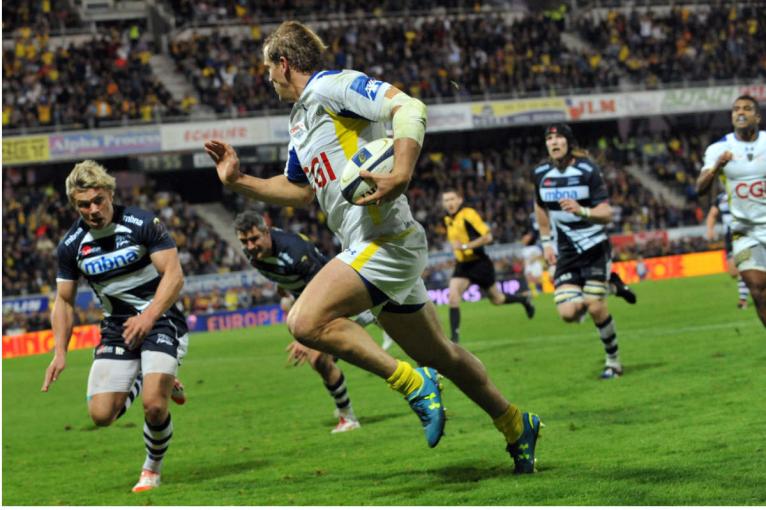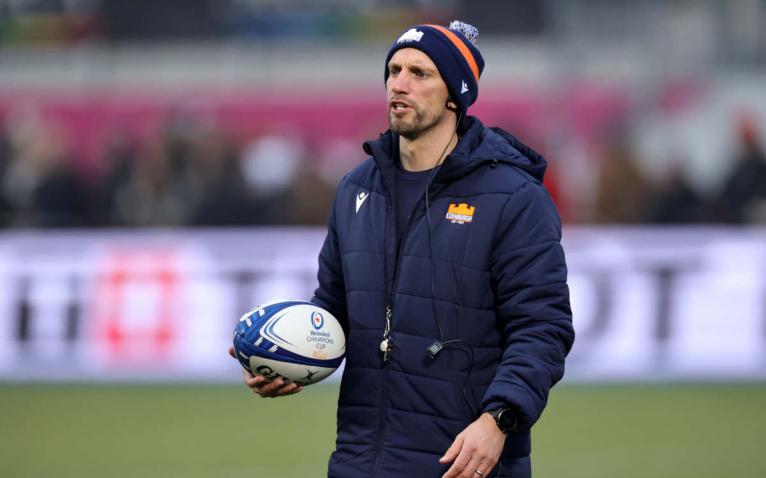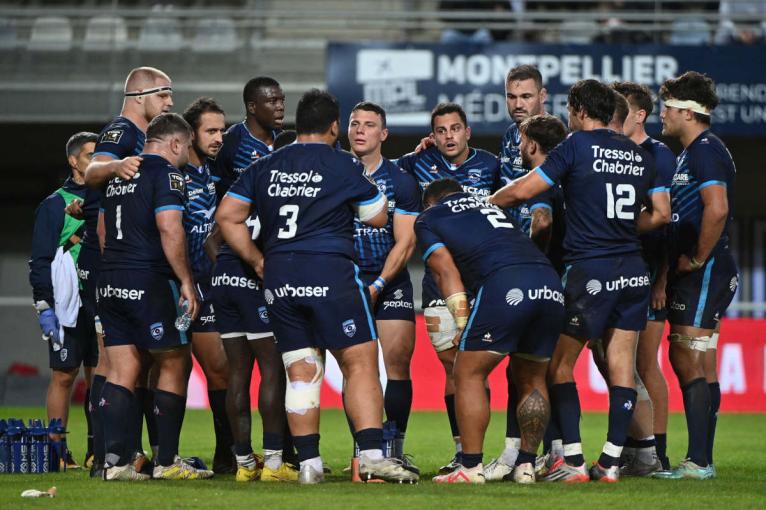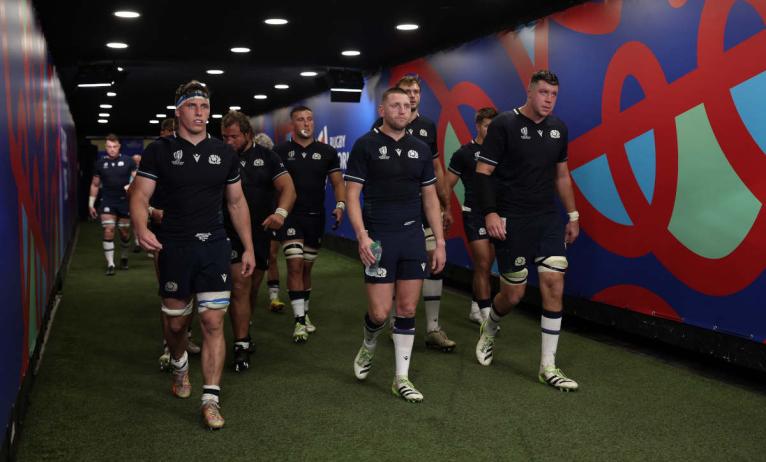Montpellier have turned to a Scot to help the club return to the Top 14 summit and the journey of Neil McIlroy to the post, which he started this month, paints a fascinating picture of Scottish rugby’s development of and contribution to the global game.
While debate in Scottish rugby tends to fluctuate from rollercoaster performances of the national team to the challenges of Glasgow and Edinburgh to keep pace with counterparts in Ireland, and the country’s struggles to develop its own talent, there is an intriguing layer of Scottish influence that flutters beneath the surface. McIlroy is one of the most successful but arguably least well known in an historic trend of exporting talent, his story coinciding with French rugby’s shift from an over-reliance on imports to developing young talent that has again united the country behind its national team.
Having spent 19 years in Clermont Auvergne’s backroom, latterly as general manager, as the club drove a path to the top of the French game and won European honours, McIlroy was enticed to take a step south to become Sporting Director with Catalan Dragons last year. He loved the change of scene and code, and being part of a charge to last month’s Super League Grand Final, but when approached by Montpellier to restructure the club under Mohammed Altrad, he found it too good an opportunity to turn down.
“I loved my time with Dragons and was very happy,” he said, “and I loved learning new things in a new code, but the Sporting Director role at Montpellier is a really important and challenging one, and it really attracted me. And the Top 14 remains one of the most powerful competitions in world rugby. We now have young French lads coming through across the clubs so we’re seeing the French team becoming the force it should be again. It was a shame they didn’t make it to the World Cup final as you felt the whole country was right behind them, and that hasn’t always been the case.”

The majesty of the 2023 Rugby World Cup is a world away from McIlroy being handed his first pro playing contract as one of Scotland’s most reliable club props, a player built square from his thighs to his jawline and immovable in most scrums. Indeed, a very fit specimen now, he is quite a few stones lighter now at 56 years old than in his 20s.
In 1997, McIlroy was one of the new wave of amateur players offered pro contracts by the Scottish Rugby Union (SRU), alongside the likes of Scott Hastings, Craig Chalmers, Kenny Logan and Bryan Redpath, two years after the sport was declared ‘open’. The SRU, in common with Ireland, decided against competing in the first 1995-96 European Cup, and put together part-time squads in 1996-97. At that stage, there were no professional league competitions, so the leading performers in Scotland had only two months of European games and were then back to playing for their club and the day job, which for McIlroy was as a prop for Jed-Forest and housing officer with Scottish Borders Council.
In 1997-98, the SRU joined the pro revolution and gradually contracted over 100 players into four teams based on its existing district structure
In 1997-98, the SRU joined the pro revolution and gradually contracted over 100 players into four teams based on its existing district structure – Caledonian Reds, Glasgow, Edinburgh and the Borders Reivers – and set about working out how you trained full-time rugby players. The Reivers and Reds quickly built the biggest followings, among crowds and young supporters, and McIlroy’s Reivers claimed Scotland’s first European Cup win, over Llanelli Scarlets in front of 6,000+ on a Wednesday night at Hawick’s Mansfield Park.
By January, 1998, however, around half of the three-year contracts were being ripped up, the SRU – against the wishes of its Director of Rugby Jim Telfer – insisting that without a guaranteed European Cup or broadcast funding pot, still to be agreed, they could not afford 100+ contracts, ranging then from just £10,000 for youngsters to the ‘high earners’ on £30,000. They looked on enviously as the ‘Tiger Economy’ powered Ireland’s four districts, and wealthy rugby-mad benefactors stumped up to support English and Welsh teams.

McIlroy was one of around 60 players handed their pro rugby P45s inside six months, and while most players returned to their old line of work he contacted a rugby agent on the off-chance someone might be looking for a 30-year-old prop. An offer came in from Nice, which sounded nice, and he and wife Moira, who worked in the local bank, decided to up sticks and try a new adventure. It took them from Nice to Beziers and to Clermont, all clubs steeped in rugby communities the way McIlroy knew from his Borders upbringing.
“It was definitely an adventure – a step into the unknown,” agrees McIlroy. “Moira and I had no idea what we were going to, but we just agreed to be open-minded and see what it brought. We knew we could always come back but having been given the promise of a three-year go at pro rugby, I wasn’t ready to let it go, and now, 25 years on, I have to say it was the best thing we ever did.”
As McIlroy senior takes his first steps at Montpellier, he is now one of many Scots ploughing furrows around world rugby.
The couple had two boys, Ryan (who arrived just months after they did in France) and Greg. Ryan is currently with Toulon as a strength and conditioning coach and, after a placement with Scotland, sports management student Greg is at Stade Francais on an internship. Naturally, they are fluent in three languages – French, English and ‘Jethart’ (they keep in regular touch with Jedburgh family).
As McIlroy senior takes his first steps at Montpellier, he is now one of many Scots ploughing furrows around world rugby. Of the more well-known, Scots-born Aussie-raised and former Borders flanker Matt Taylor left the Scotland team to become Wallabies assistant; the first South African to join Scotland’s pro ranks, Matt Proudfoot, moved from the Springboks to England’s coaching staff after the 2019 World Cup win; Bryan Redpath is back coaching with London Scottish after leading Sale and Gloucester; Carl Hogg has enjoyed a long spell at Gloucester; Mike Blair and Greig Laidlaw are coaching in Japan; Stevie Scott is at Bath; and as well as now having over 50 technical rugby inventions to his name, Richie Gray coaches Toulon, after spells with the Springboks, Fiji, Montpellier and the Miami Dolphins.

Among the less well-known is another Jedburgh man, Clark Laidlaw, who this year moved from New Zealand sevens head coach to Hurricanes head coach, where Galashiels man David Gray is Head of Physical Development. Roddy Grant is coaching at Ulster, Calum Macrae at Treviso, Scott Newlands at Pro D2 club Valence Romans Drome south of Lyon and former lock Scott Murray has been coaching San Diego Legion in the MLR for the past five years. The late Greig Oliver was a key figure in Munster’s development, as witnessed by Irish rugby tributes after his death in the summer, and influential in Conor Murray’s emergence as a world-class scrum-half. There are others and it stretches outside coaching with former Scotland physios Stephen Mutch and Bob Stewart visible during the World Cup as chief physio with Ireland and medical lead with the England men’s team respectively.
Intriguingly, very few have been invited to give input to a Scottish game now largely managed by South African and English coaches, and some have even failed in interviews for posts back in their homeland. But McIlroy admits that he would be hard pushed to leave the French game that gave him a career.
He acknowledges: “I do keep in touch with guys back home and I still feel it when Scotland don’t do well. It was tough to see us go out in the pool stages again this year, even though it was a pretty tough draw, and part of me would like to return and help rugby at home at some stage. But my focus is squarely on Montpellier now and getting back into Top 14 life.
McIlroy was head-hunted [for Montpellier] because of what he did with Clermont, during a period where they went from the league’s basement to Top 14 and European champions.
“My new role is to oversee the general rugby side, the rugby management at the club from juniors through to the pro team. Richard Cockerill, the ex-Edinburgh coach, is responsible for the first team and day-to-day or week-to-week winning of games and hopefully titles. But the club believes it is in need of restructuring, so that’s my focus. Montpellier has the means, the squad and facilities but has had a big turnaround in coaches in recent years, not all of whom have left their mark in a positive way.
“So, while they were champions only two years ago, they were 11th last year, and people have told me they don’t quite understand how they became champions, nor how they fell to 11th. So, there’s a feeling it lacks the organisation to be able to look La Rochelle in the eyes and believe we can match them, and Mr Altrad wants nothing but the best for Montpellier.
“As I said, a challenging job, but one I’m looking forward to!”
McIlroy was head-hunted because of what he did with Clermont, during a period where they went from the league’s basement to Top 14 and European champions. He attracted few headlines and his influence was not on the first team’s performance directly, but the strong friendships with the likes of Aurelien Rougerie, Wes Fofana and coach Vern Cotter underline his importance to the success.

“I was actually prouder of the fact that we had, I think, 15 consecutive years of semi-finals in either the Top 14 or Champions Cup, than of the titles,” McIlroy says, “because that consistency of success came from the organisation, structure and an environment everyone enjoyed being part of, which is vital to being able to compete.
“Of course, you need good coaches and good players to win games, but you also have to give them the means to play top-quality rugby consistently. And now with the JIFF system [France introduced a quota requirement for matchday squads to combat the plethora of foreign signings and ensure opportunities for young French players] we’ve seen the benefits to the French team of clubs focused on improving the French game. As well as Aurelien and Wes, guys like Thomas Domingo, Loic Jacquet, Damien Penaud and Alivereti Raka, and many more, came through our academy system.”
Off the back of maulings for Scotland at under-20 level, concerns around failing pathways and nearly half the current Test squad having been imported, are there lessons Scotland could learn from France?
I’m not here to criticise Scottish rugby at all, but what I would say is how you manage that category from 17 to 20 is crucial. Players are then turning from boys to men and they need to be exposed to good quality of games regularly
“Yes…” McIlroy begins tentatively. “Look, in the last few years, I’ve heard lots about supposed Scottish rugby failings, to the extent that I’ve added it to ‘politics’ as something not to get involved in, because it divides opinion so much!
“But, what France did was an approach to a similar problem – very few opportunities for local players to develop while playing high-level rugby. Clearly, we have many more players in France than in Scotland, but there is a similar issue where young Scottish talent, and there is plenty of young talent there, is only getting the chance to learn the game when into the fully-fledged pro ranks of Edinburgh or Glasgow, if they get there, or with Scotland. They haven’t the same level of exposure to quality rugby as our boys in France, or even the kids in England or Ireland, have had in their teens, and you can see that when they step up.
“I’m not here to criticise Scottish rugby at all, but what I would say is how you manage that category from 17 to 20 is crucial. Players are then turning from boys to men and they need to be exposed to good quality of games regularly – the best way to learn rugby is still to play the game. You need to be well conditioned but you don’t learn the game in the gym or even in training. I watched the French under-20s against Scotland a few years ago and while the Scottish boys were comparable size-wise, there was a big difference in the power and nous of how to play the game.

“I’m afraid I don’t have the answer to how Scotland change that, and as you know we have big, wealthy clubs in France, so it’s not comparing like with like, but the SRU are pretty wealthy [£68m turnover last year] and I think they have to find a way to expose the talent from 16/17 to regular, quality games or they will fall further behind.”
Looking back on his own career, McIlroy adds: “I was lucky. What seemed like a bad time for Scottish rugby actually gave me a great opportunity. I came from a really good club at Jed, I was surrounded by good people there and with the South and the Reivers, which gave me good values. I can still remember talking to Mark Moncrieff and Jim Hay as the Borders team was disbanded and we wondered what next, and actually remember us agreeing that one place we wouldn’t go was France, because the rugby was violent and dangerous there – three months later I was on a plane to Nice!
“So, yes I took a chance and I haven’t looked back, but I’m very conscious that I was in the right place at the right time.
“We’re now 25 years in, my family have grown up here and while I love Scotland and Scottish rugby, I think what you’re seeing with all the Scots coaching or managing abroad is the great Scottish tradition for exploration. For me, the French Top 14 is a wonderful, big animal and I am looking forward to getting my teeth back into it.”



Comments
Join free and tell us what you really think!
Sign up for free